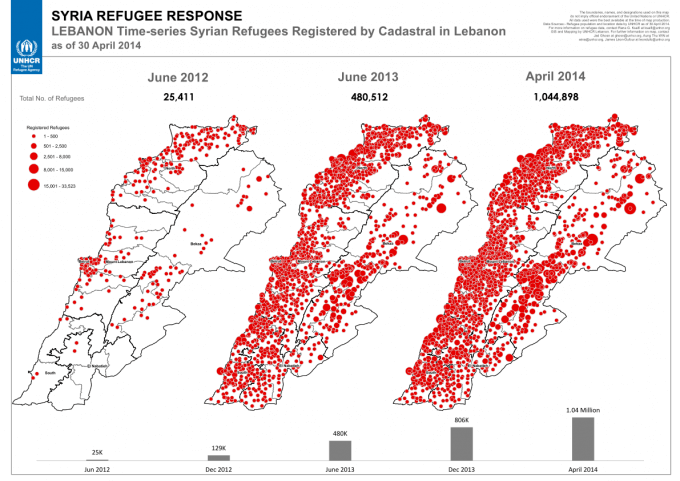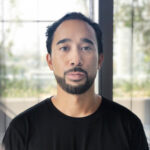Four million Syrians have fled their country and millions more are living in dire conditions in refugee camps. But very soon, a tiny fraction of them will be calling Canada home.
This week, the Canadian government will begin resettling refugees throughout the country, with priority given to those identified as the most vulnerable. This includes women at risk and complete families — most coming from Lebanon, Jordan and eventually Turkey.
One family that will set foot on Canadian soil in the coming days is Mahmoud Hussein Maree, 37, his wife Radiyah, 39, and four sons Hussain, 19, Mohammad, 18, Ahmad, 15, and Abdel Hamid, 5. They fled their home in Syria three years ago and have been living in Lebanon ever since.
The family’s life in Lebanon
“I decided to leave because I was afraid for the country. I was afraid for my children,” Maree says through a local interpreter. “And Lebanon was the closest to Syria.”
Originally from Aleppo, one of the cities hardest hit by the civil war, Maree left everything behind — his home, his business, his sister — and took his wife and children to Lebanon.
“I left with the clothes that were on me. I do not know what happened to my house or my clothes shop,” he explains. “Now we have relatives in Lebanon, Jordan and Turkey. When we first left Syria we did not have any relatives in these places, but now we do.”
Lebanon has now been pushed to its limits after the influx of Syrian refugees. According to the UN Refugee Agency (UNHCR) there are approximately 1.4 million Syrian refugees in Lebanon.
“I decided to leave because I was afraid for the country.”

The country has absorbed the refugees but not without experiencing economic, political and social repercussions. Tensions are high and the economy and its resources strained.
Maree and his family, registered by the UNHCR as refugees over a year ago, are in the final stages of the screening process with Canadian officials and are supposed to leave for Canada this week, he says.
However, like many, Maree is unaware of where he will be staying in Canada or what steps will follow after his arrival.
“I don’t know, they haven’t told me. But I am very happy to go to Canada. I am going with the Canadian people because they are helping Syrians,” he says.
Screening process for refugees
Of the 10,000 refugees coming to Canada this year, roughly 80 per cent of them will be privately sponsored refugees. This means sponsors are responsible for the financial needs, accommodation, clothing and food for the first year of a family’s resettlement into Canada.
The remaining 2,000 will be government-assisted refugees.
Despite security concerns and varied responses among Canadians, the reaction towards refugees has been positive overall.
Peter Goodspeed, spokesperson for the Toronto-based resettlement organization Lifeline Syria, says that anybody coming to Canada as a sponsored refugee will be scrutinized more heavily than anyone else entering the country.
“I am going with the Canadian people because they are helping Syrians.”
“It’s pretty extensive,” he explains. “A refugee will be screened and registered by UNHCR first, then referred to Canada. They won’t refer any case to Canada if they think there is any remote possibility that there might be a security problem.”
Canadian immigration officers will have face-to-face interviews with the refugees and decide whether to continue with the process. If approved, the case goes forward for three separate security screenings with the Canadian Security Intelligence Service (CSIS), the RCMP and Canadian Border Services.
Once refugees have passed all necessary checks, a doctor will perform medical examinations on-location and give them visas to come to Canada. At this point, they will immediately become permanent residents.
According to the Government of Canada, refugees will then be welcomed by Border Services and a final verification of identity will be completed at the point of arrival in Canada.
The family’s imminent arrival in Canada
At the time we spoke with Maree in Lebanon, he didn’t know too much about Canada. From what he’s heard, “Canadians were down to earth people.” This was enough for Maree when he was faced with the decision to either apply to the U.S. or Canada.
It’s been a long wait for the family, but their application has recently been fast-tracked by the Canadian government.
“It was very excellent (the refugee process). It was not difficult for me Alhamdullilah (Praise be to God). They (UNHCR) contacted me and I went to the interviews — about five of them. I have not kept count. I have another interview on December 8th and then we will be travelling to Canada,” he says.
Maree will leave behind his extended family in Syria and other family members scattered throughout Jordan, Lebanon and Turkey who are also refugees.
“I am indebted to the Canadian people because they want to help the Syrian people. I am very, very happy,” Maree says.
As of Dec. 3, 1,341 refugees have been issued permanent residence, but have yet to arrive. Another 9,694 are currently being processed according to the Government of Canada.
Photo Credit: UNHCR
Mark is an entrepreneur, freelance writer and former journalist. He currently works as a brand consultant.





